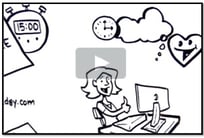If having lots of levity and play in the workplace points to signs of happiness and longevity and work, look no further than the tenures of the longest running late-night show hosts as a guide.
- Jon Stewart: 17 total years
- Jay Leno: 21 total years
- Conan O’Brien: 21 total years
- Johnny Carson: 30 total years
- Dave Letterman: 33 total years!
Source: Vocativ.com

Now, we all know that hosting a late-night comedy and entertainment show is not exactly the nine-to-five—but isn’t that the point? Don’t most of us office and knowledge workers come home feeling burnt out and wanting more from our day? And for managers, aren't your teams and employees lacking a certain cohesion and spark?
The data tells us the average worker is just plain burnt out.
- 70% of American workers are not engaged at work. (Gallup)
- 70% of workers worldwide feel they do not have regular time for creative or strategic thinking. (The Energy Project via The New York Times)
- 59% of worldwide workers are physically depleted, emotionally drained, mentally distracted, and lacking in meaning & purpose. (Harvard Business Review and The Energy Project)
And senior management is not immune. A May 2014 New York Times article, “Why You Hate Work," cited a recent survey of 72 senior leaders by Srinivasan S. Pillay, a Harvard Medical School psychiatrist and professor studying burnout. The survey reports that nearly all of the senior leaders polled are experiencing some form of burnout at work.
It’s a growing problem in the modern workplace spurring studies and headlines everywhere from major international publications to niche industry blogs—like this one from the HR-focused TLNT: “Will 2015 Be the Year of Worrying About Employee Burnout?"
Clearly, we should be worried. The overall wellness and productivity of our employees and organizations are at stake. So, what to do about it?
 Fortunately, there are many forward-thinking experts leading the movement for more play and joy in the workplace, helping to illuminate the many benefits of a work-play balance.
Fortunately, there are many forward-thinking experts leading the movement for more play and joy in the workplace, helping to illuminate the many benefits of a work-play balance.Here are three reasons why we need more play at work—now, more than ever:
Reason #1: Happiness inspires productivity.
Shawn Achor, CEO of GoodThink Inc. and bestselling author of Before Happiness and The Happiness Advantage, doesn’t want you to be average. In his research in the field of positive psychology, Achor focuses on the outliers: those who exhibit exemplary levels of happiness, productivity, and success, and what we can learn from them.
We need to raise this average up in our workplaces and escape “the cult of the average,” Achors states in his 2011 TEDxBloomington talk, “The Happy Secret to Better Work." We can do this by reversing the formula for happiness and success from, If I work hard and gain success, I’ll be happy to the much-more sustaining, If I’m happy, I’ll be more productive and successful.
Reason #2: Play is essential to our well-being.
Gwen Gordon knows a lot about play. The Emmy-winning writer and creative director began her career in a world of play on none other than Sesame Street, building muppets for the landmark show. She then went on to bring her insights to the business world at an Apple research group at MIT Media Lab, and later at Xerox PARC, IDEO, and PepsiCo.
In a 2013 Huffington Post article, Gordon writes about the need for “restoring the playground,” our well-being, and bringing us adults back to our naturally playful natures.
“The playground is our true habitat,” she writes. “Within it we become truly human, without it we perish... Perhaps the most important project of our time is to restore our own habitat, to wake up to our deep need for the unbridled joy, freedom, and fullness of play... and take it seriously.”
Gordon is currently producing a PBS special about the need for play in our modern lives and workplaces called Now Playing. Watch the trailer below.
Reason #3: Play makes us more creative.
In his talk at the 2008 Serious Play Conference, CEO of powerhouse design firm IDEO, Tim Brown, shared some revealing truths about adults and play. We’re embarrassed about sharing our ideas to our peers as adults, he says—we’re reluctant, in a sense, to go out on a creative or playful limb.
But exploring in this way actually leads to greater quantities of idea generation and much better ideas. Openness leads to play, and play leads to creativity and innovation.
“Playful exploration, playful building, and role play. Those are some of the ways that designers use play in their work,” says Brown.
But play is not anarchy, he cautions. Play has rules that help lead to productive and constructive play. In the adult work, he asserts, we need to learn that we can do and be both. We can transition from play to work, divergence to convergence, and achieve markedly successful outcomes.
Play in the workplace clearly has some huge potential to achieve practical, real-world results—and dramatically transform the success of our organizations at large. Are you game?
What are your thoughts about bringing more play into the workplace? Do you think play will help improve your work performance, teams, or employee engagement? Share your comments below.









